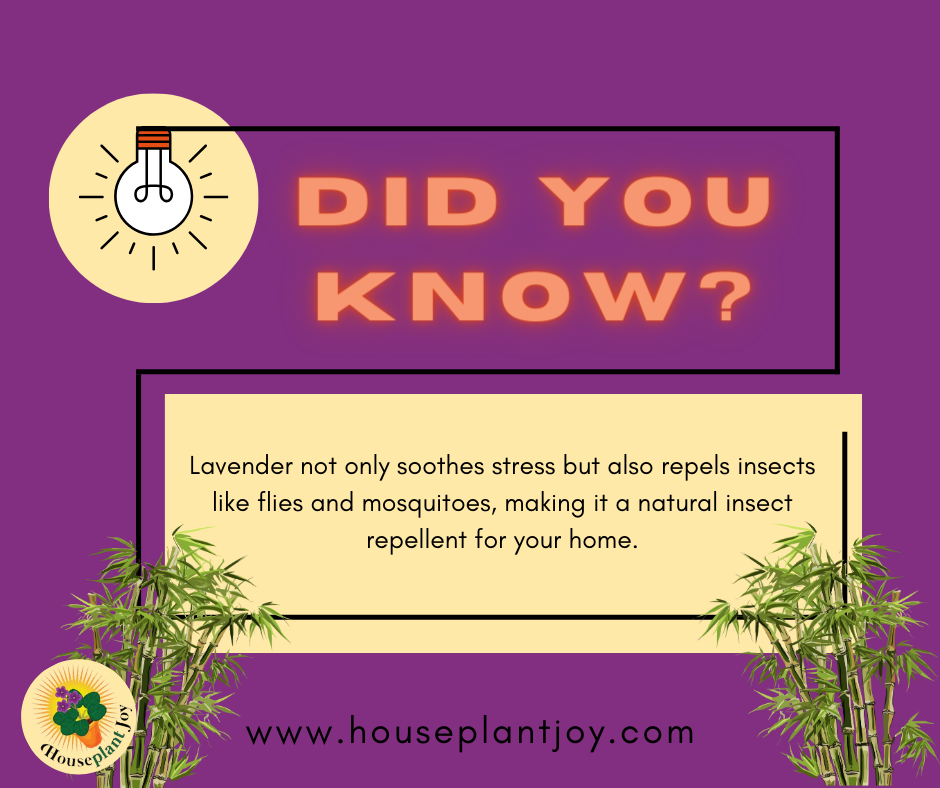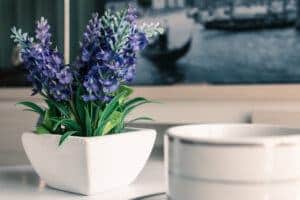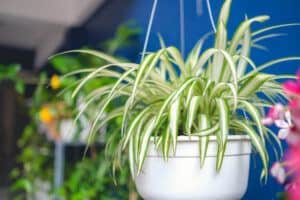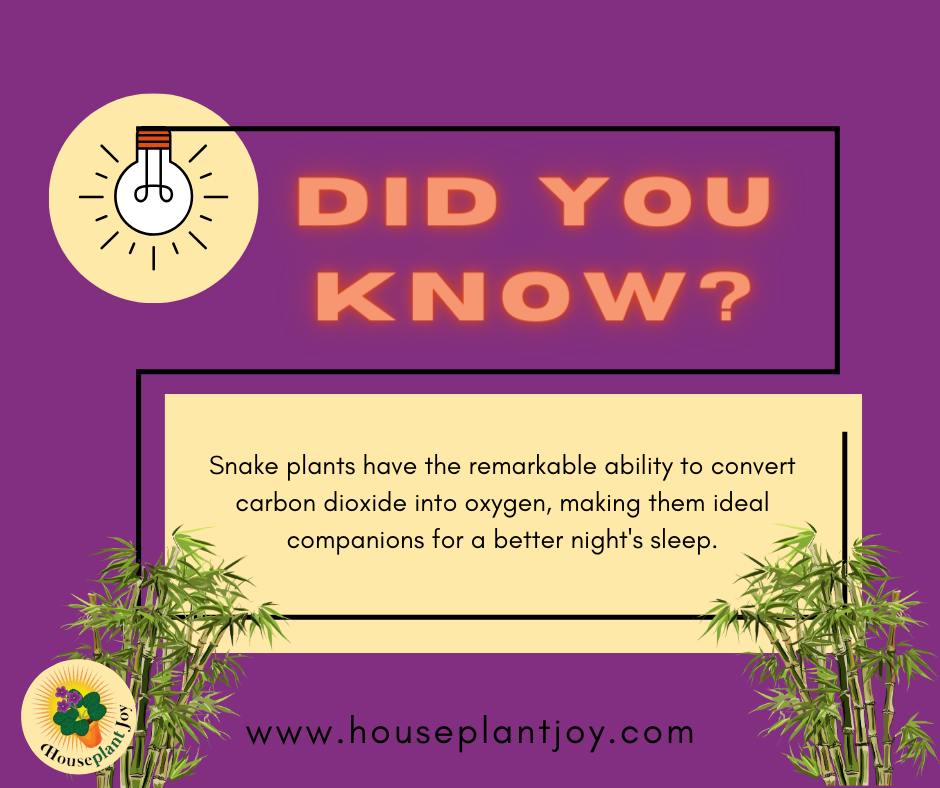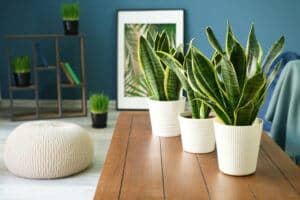HousePlantJoy is supported by our audience. When you purchase through one of our links, we may earn a small affiliate commission. As an Amazon Associate I earn from qualifying purchases. Your cost is not affected.
==================
In the hustle and bustle of our daily lives, we often seek solace and serenity within the confines of our homes. While we decorate our spaces for aesthetic appeal, there’s an incredible yet often overlooked benefit that certain houseplants bring into our lives – stress reduction.
Welcome to the world of indoor gardening, where these green companions not only beautify our surroundings but also offer a powerful antidote to stress. In this article, we will explore the soothing world of houseplants and introduce you to seven remarkable stress-reducing varieties that can transform your living and working spaces into havens of tranquility.
So, if you’re looking to enhance your mental well-being, boost your mood, and create a cleaner, more peaceful environment, read on to discover the incredible health benefits of these 7 stress-reducing houseplants.
7 Stress-Reducing Houseplants
Throughout history, plants have helped people relax. Studies show that one benefit of indoor gardening is reducing stress with houseplants in our homes. But which plants to choose? We’ve gathered a brief list to get you started. Using these 7 plants to reduce stress might propel you into a life with plenty of inspiring greenery!
We all know that indoor plants improve aesthetic value, but the right houseplant can also improve your mental health. Indoor landscaping provides a calm and relaxed environment to live and work in. As they boost your emotions, plants reduce stress and give you a feeling of joy, better sleep, boost memory, and a clean environment to breathe free from toxic pollutants. Plants serve as mood enhancers and noise reducers as well. They produce positive energy that works secretly to satisfy and secure you.
A plant that looks nice seems excellent, but the one that works magically on your health is amazingly better. You can learn that adopting a desk plant can improve your health without slightly changing your routine.
7 Plants to Reduce Stress: Lavender Leads the Way
A flowering plant with a pleasant aroma, lavender possesses a soothing, stress-relieving quality. If you’re facing an unpleasant day, a lavender plant is your best companion to fight emotional stress. It has a positive effect on your mood anxiety and acts as an anti-depressant.
You can place your lavender plant anywhere to enhance the serenity. However, keeping one in your bedroom offers the exceptional sleep and anxiety relief that lavender is well-known for. As an anti-inflammatory, the lavender plant has a positive effect on the respiratory tract. As such, it proves helpful in relieving asthma. Most people love the aroma of lavender, but most insects hate it. It keeps flies, moths, and mosquitoes away from your house. Moreover, lavender oil treats skin blemishing reduces inflammation, and wound healing.
Lavender
It prefers full, bright sun and well-drained soil. Water when the soil begins to dry. It grows best with infrequent but deep watering.
Spider Plant: Also One of the 7 Plants to Reduce Stress
These slender sword-like leaves remain a favorite among houseplants. With simple maintenance, it offers multiple benefits. The spider plant spreads happy vibes, reduces stress, and increases productivity. The plant releases oxygen, and just like a sponge, it absorbs toxins from air-purifying it from formaldehyde and carbon monoxide. It also targets xylene in the air. If you desire to breathe clean, a spider plant is an excellent choice.
Spider Plant
Spider plants like to grow in a less sunny place instead of direct sunlight. It needs water occasionally. If you keep the soil moist, the spider plant will reward you in many ways. It grows babies readily, which you can plant or share with friends.
Peace Lily: A Stress-Reducing Plant from the 7
An attractive plant. The peace lily is a beautiful addition to your dining or side table. It works as a dependable air purifier, absorbing vapors from acetone and alcohol. It helps in maintaining a mold-free environment, reducing the growth of molds. The peace lily performs well when placed in the bathroom as it reduces mildew growth on curtains and tiles. The peace lily is best suited for a room that gets little sunlight.
However, please be careful when choosing a location for your English Ivy plant. This plant is mildly toxic and might irritate your pet’s digestion if they nibble.
English Ivy plants require sunlight directly for about four hours. Moist soil, not overly wet, allows the plant to remain healthy.
English Ivy: A Popular Choice Among the 7 Stress-Reducing Plants
Do you love pets? Then it would be best if you had English ivy in your home. It works against airborne pollutants, including fecal matter. It should be on your office desk as it absorbs benzene (a chemical usually present in office equipment) from the environment. You will have a better focus/concentration on your work. Some of our household cleansing product contains formaldehyde. English ivy can easily filter it from the air.
English Ivy
Ivy possesses anti-inflammation solid properties. Due to the plant’s ability to heal internal inflammation, patients with arthritis can rub the leaves of ivy directly on the inflamed area or consume it as tea. Ivy leaves also improve the function of the liver by detoxifying the body. Leaf extract can also be applied on hair directly(if you are not allergic) to eliminate itching lice.
Rosemary: One of the 7 Plants to Reduce Stress, an Herb Houseplant
For an aromatic plant that boosts your memory, look to the herb Rosemary. It’s scientifically proven that rosemary’s aroma improves a person’s mental performance and concentration. It has anti-oxidant compounds to neutralize free radicals, too!
Rosemary
Rosemary leaves can be cooked. It gives a flavorful taste and high nutritional value to culinary dishes such as roasted vegetables.
Snake Plant: Your Stress-Busting Green Companion
A versatile plant. The snake plant is at the top among all the air purifier plants. As it filters the environment from formaldehyde (found in tissue paper), consider placing it in the bathroom. But you also need a plant in your bedroom because it can convert a lot of carbon dioxide into oxygen at night when you sleep. Snake plants produce enough oxygen that a person can survive in a completely sealed room with six to eight plants converting carbon dioxide into oxygen for him. If you are allergic, the snake plant will be your friend as it reduces airborne allergens.
Snake Plant
A Snake plant is the easiest to maintain. The snake plant might become your favorite if you are too lazy to water plants. Snake plants give you clean air even if you forget to water it for weeks.
Boston Fern: A Beloved Stress-Reducing Plant Choice
Ferns are well-known houseplants. Boston ferns have attractive looks with many health benefits. They work as a natural humidifier, maintaining the air’s moisture level, making them a perfect match for people suffering from weather problems or dry skin. Boston ferns perform well in low temperatures and are best suited for air-conditioned rooms in your home. They can also clean the environment from formaldehyde. Hanging pots of Boston fern do a great job of cleaning the air in your home.
Boston Fern
Don’t forget to mist the leaves of your Boston fern frequently. These beautiful plants love a daily misting to keep their fronds fresh!
The Science Behind Indoor Plants: Stress Relief and Wellness Boost
Numerous scientific studies provide compelling evidence that indoor plants contribute significantly to stress reduction and overall well-being. These green companions offer a natural and effective way to combat stress, with each type of plant playing a unique role in promoting mental health and relaxation.
- Lavender: Scientific research shows that lavender, specifically its essential oil, contains active components like linalool and linalyl acetate, which exert anxiolytic effects by inhibiting voltage-gated calcium channels, reducing 5HT1A receptor activity, and increasing parasympathetic tone. Clinical studies have confirmed its efficacy in reducing anxiety, as measured by decreased scores on the Hamilton Anxiety Rating Scale [1].
- Spider Plants: Nurturing and watching spider plants grow can be a rewarding and anxiety-relieving experience, according to studies that suggest plant care reduces stress and improves mental health [2].
- Peace Lily: The aesthetic appeal of peace lilies is backed by their ability to decrease workplace stress levels. They purify indoor air of toxins and promote positive physical and psychological effects, making them a calming presence in indoor spaces [3].
- English Ivy: This plant is renowned for its stress-reducing qualities. Growing English ivy not only cleanses indoor air of toxins but also positively impacts physical and psychological well-being, contributing to a more tranquil and stress-free environment [4].
- Rosemary: Much like lavender, rosemary contributes to stress reduction and relaxation. Its presence can help decrease stress levels by purifying indoor air and promoting a sense of calm and well-being [5].
- Boston Ferns: Lush green Boston Ferns have been shown to alleviate stress and anxiety, creating an overall calming atmosphere. Research indicates that their presence can lead to improved mental well-being and relaxation, providing a natural way to find tranquility in your space [6].
- Snake Plant: Also known as ‘mother-in-law’s tongue,’ the snake plant is a low-maintenance and durable house plant. It possesses the remarkable ability to purify indoor air by removing toxins and is reputed for providing protective energy, making it a valuable addition to reduce stress, alleviate respiratory issues, and enhance overall well-being [7].
With the weight of scientific research supporting the stress-reducing properties of these indoor plants, incorporating them into your living or workspace can help you create a more peaceful and stress-free environment, promoting better mental health and relaxation.
For a deeper dive into the scientific studies, you can refer to the following sources:
7 Stress-Reducing Houseplants for Incredible Health Benefits
the research overwhelmingly supports the idea that having indoor plants not only enhances our living spaces but also contributes positively to our well-being. They’re like green companions that bring a touch of nature into our daily lives, without any adverse effects on our health.
Caring for plants isn’t just about aesthetics; it’s a way to stay engaged and active, especially for seniors. And it can be a wonderful way for families to come together. Parents and children bonding over plant care is more than just a shared responsibility; it’s a chance to build lasting memories and strengthen family bonds.
So, whether you’re a seasoned green thumb or a newbie in the world of plant care, adding some green to your life can be a simple yet rewarding way to improve your quality of life and bring your family closer.
? Dive into the World of Houseplant Joy! ?
Discover the magic of decorating with houseplants and stress relief through green companions. Join our vibrant community on social media:
? Facebook – Uncover inspiring content, tips, and lively discussions.
? Instagram – Explore stunning visuals, share your green sanctuary, and connect with fellow plant enthusiasts.
? Pinterest – Pin your way to plant perfection with creative ideas and DIYs.
? Twitter – Stay in the loop with the latest news, product reviews, and more!
Join us today and let’s grow together. ?? #HouseplantJoy
Read More


